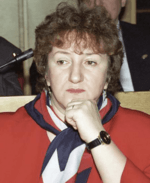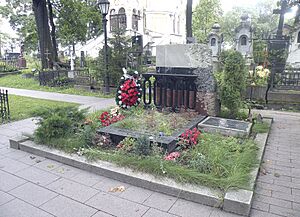Galina Starovoytova facts for kids
Quick facts for kids
Galina Starovoytova
|
|
|---|---|
| Галина Васильевна Старовойтова | |
 |
|
| Born |
Galina Vasilyevna Starovoitova
17 May 1946 |
| Died | 20 November 1998 (aged 52) |
| Nationality | Russian |
| Alma mater | Leningrad College of Military Engineering Leningrad University Institute of Anthropology and Ethnography |
| Known for | human rights activism with participation in the Moscow Helsinki Group |
| Awards | Commander's Grand Crosses of the Order of the Cross of Vytis |
Galina Vasilyevna Starovoitova (Russian: Гали́на Васи́льевна Старово́йтова) was born on May 17, 1946, in Chelyabinsk, Russia. She was an important Russian politician and a scientist who studied different cultures. Galina was known for working to protect the rights of ethnic minorities and for helping Russia become more democratic. She passed away on November 20, 1998, in Saint Petersburg.
Contents
Early Life and Education
Galina Starovoitova was born in the city of Chelyabinsk, located in the Ural Mountains. Her father was from Belarus, and her mother was Russian. She studied at the Leningrad College of Military Engineering, graduating in 1966. Later, in 1971, she earned a master's degree in social psychology from Leningrad University.
In 1980, Galina received her doctorate in social anthropology. This is a field of study that looks at human societies and cultures. She worked for 17 years at the Institute of Ethnography. Her research focused on the role of different ethnic groups in Soviet cities. She wrote her PhD thesis about the Tatars living in Leningrad (now Saint Petersburg). She also wrote many articles about different cultures and the people of the Caucasus region.
In 1988, Galina supported the idea of self-determination for the Nagorno-Karabakh region. This means people in a region should be able to decide their own future. In December 1988, she traveled with a famous scientist, Andrei Sakharov. They visited Armenia, Azerbaijan, and the Karabakh region to try and help solve conflicts there. From 1994 to 1998, she taught at Brown University in the United States. She gave lectures on how ethnic minorities seek self-determination.
Political Career
Galina Starovoitova started her political journey in 1989. She was elected to the Congress of People's Deputies of the Soviet Union from Armenia. In this Congress, she joined a group of reformers. This group was led by Andrei Sakharov and included other important figures like Boris Yeltsin. Her main work in the Congress was on issues related to different nationalities. She also helped plan a new government structure and worked on a new Soviet constitution. She strongly supported the Armenians in Nagorno-Karabakh during their conflict with Azerbaijan.
In June 1990, Galina also won a seat in the new Russian parliament, the RSFSR Congress of People’s Deputies. She represented Leningrad (now St. Petersburg). She won this election easily against many male candidates. She served in this role until the Congress was dissolved in 1993.
In 1991, Galina was a spokesperson for Boris Yeltsin during his successful campaign to become the president of Russia. Many people thought she should become vice president or even minister of defense. Instead, she became a presidential advisor on issues between different ethnic groups. She held this position until 1992. She was later dismissed, partly because she criticized the government's actions in the North Caucasus.
Before returning to her work in parliament in 1995, Galina worked at an economic institute in Moscow. She also co-led the Democratic Russia Movement. She helped organize international conferences in Moscow about important historical topics.
In 1995, she was elected to the Russian State Duma. This is like the lower house of parliament. She was part of the "Democratic Russia - Free Workers Union" movement. This movement was led by her and other important human rights activists.
Galina Starovoitova was a strong supporter of ethnic minorities. She believed that if nations have the right to self-determination, then groups within Russia should have it too. She worked with others, like Sergei Kovalev, to try and prevent the First Chechen War. They talked with Dzhokhar Dudaev to find a peaceful solution. However, other officials convinced Yeltsin that military action was needed. When the war started, Galina strongly criticized Yeltsin's decision.
She was also on the editorial board of a scholarly journal called Demokratizatsiya. This journal focused on how countries become more democratic after the Soviet era. Galina attended many international meetings and spoke with world leaders. These included Margaret Thatcher, Jacques Chirac, and Lech Wałęsa.
Galina Starovoitova was very concerned about the power of security services in Russia. She believed that a process called "lustration" was needed. Lustration would prevent people who had worked for certain past government security services from holding important public jobs. She tried to pass a law on lustration many times in the Duma, but it was not supported by other elected officials.
In April 1998, she became the leader of the "Democratic Russia" party. She aimed to prepare the party for the upcoming elections in December 1999. At that time, many people with backgrounds in security services were becoming prime ministers. Galina tried to prevent such people from gaining power. She voted against nominating Yevgeny Primakov for Prime Minister, as she opposed the broad powers of the FSB (Federal Security Service).
Assassination and Investigation
Galina Starovoitova was tragically killed on November 20, 1998. She was shot in the entrance of her apartment building in St. Petersburg. Her assistant, Ruslan Linkov, was also hurt in the attack. The police investigation was closely watched by the Interior Minister, Sergei Stepashin.
In June 2005, two men, Yuri Kolchin and Vitali Akishin, were found guilty of her murder. Akishin was identified as the person who fired the gun, and Kolchin was the one who organized the attack. They received long prison sentences. Later, in September 2006, Vyacheslav Lelyavin was also sentenced for his part in organizing the murder. Other people involved in the case are still wanted by the police.
The official investigation stated that Yuri Kolchin, a former military intelligence officer, organized the murder. However, the people who ordered and paid for this assassination have never been found. Some people believe that Russian state security services were involved. They suggest that Galina was killed to stop her influence on Boris Yeltsin and her opposition to former KGB general Yevgeny Primakov becoming Prime Minister.
Award and Tomb
Before she passed away, Galina Starovoitova created an award. This award was for people who made important contributions to protecting human rights and strengthening democracy in Russia.
The award was supported by Irina Thomason and a fund for protecting the rights of children and women. Some of the people who have received this award include:
- Gleb Yakunin, a Russian Orthodox priest
- Larisa Bogoraz, who helped start the Moscow Helsinki Group
- Anatoly Sobchak, a former mayor of St. Petersburg
- The Soldiers' Mothers of St. Petersburg (a group helping soldiers' families)
- Yuli Rybakov, a former member of the State Duma
- Valeriya Novodvorskaya, a leader of the Democratic Union
Galina Starovoitova is buried in a special tomb at the Nikolskoe Cemetery in St. Petersburg. The monument on her grave shows a tattered Russian flag. It is said that the pavement used for her grave comes from the place where she was assassinated.
Images for kids
 | Aurelia Browder |
 | Nannie Helen Burroughs |
 | Michelle Alexander |




